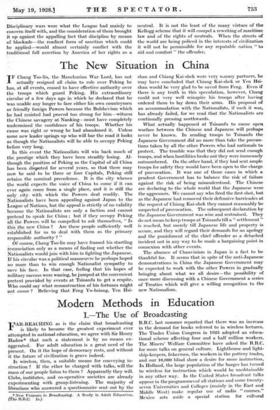The New Situation in China
IF Chang Tso-lin, the Manchurian War. Lord, has not actually resigned all claim to rule over Peking he has, at all events, ceased to have effective authority over the troops which guard Peking. His extraordinary circular of a few days ago in which he declared that he was unable any longer to face either his own countrymen or friendly foreign Powers because the Bolshevism which he had resisted had proved too strong for him—witness the Chinese savagery at Nanking—must have completely undermined the confidence of his troops. Whether his cause, was right or wrong he had abandoned it. Unless some new leader springs up who will bar the road it looks as though the Nationalists will be able to, occupy Peking before very long.
In this event the Nationalists will win back much of the, prestige which they have been steadily losing. Al- though the position of Peking as the Capital of all China has been disputed for several years, so that there may now be said to be three or four Capitals, Peking still retains the nominal precedence. It is the city whence the :world expects the voice of China to come if it can ever again come from a single place, and it is still the only _city, with which the Powers deal readily. The Nationalists have been appealing against. Japan to the League of Nations, but the appeal is strictly of no validity because the Nationalists are only a faction and cannot pretend to speak for, China ; but if they occupy Peking all the Powers will be compelled to ask themselves, " Is this the new China ? Are these people sufficiently well established .,for, for us to deal With them as the primary responsible authority ? "
Of course, Chang Tsollin may have framed his startling renunciation only as a means of finding out whether the Rationalists would join with him in fighting the Japanese. If his circular was a political manoeuvre he perhaps hoped no more than to Win enough Nationalist sympathy to save his face. In that case, feeling that his hopes of military success were waning, he jumped at the convenient pretext provided by events at Tsinanfu to get a respite. Who could say what reconstruction of his fortunes might not ensue ? Believing that Feng Yu-hsiang, Yen Hsi- shan and Chiang Kai-shek were very uneasy partners, he may have concluded that Chiang Kai-shek or Yen Hsi- shan would be very glad to be saved from Feng. Even if there is any truth in this speculation, however, Chang could not very well reinspire his troops after having ordered them to lay down their arms. His proposal of an accommodation with the Nationalists, if such it was, has already failed, for we read that the Nationalists are continually pressing northwards.
What actually happened at Tsinanfu to cause open warfare between the Chinese and Japanese will perhaps never be known. In sending troops to Tsinanfu the Japanese Government did no more than take the precau- tions taken by all the other Powers who had nationals to protect. The trouble was that they did not send enough troops, and when hostilities broke out they were immensely outnumbered. On the other hand, if they had sent ample troops for safety they would have been open to the charge of provocation. It was one of those cases in which a Prudent Government has to balance the risk• of failure against the risk of being misunderstood. The Chinese are declaring to the whole world that the Japanese were the aggressors. We cannot say who fired the first shot, but as the Japanese had removed their defensive barricades at the request of Chiang Kai-shek they cannot reasonably be suspected of provocation. The subsequent declaration by the Japanese Government was wise and restrained. They do not mean to keep troops at Tsinanfu till a " settlement " is reached, but merely till Japanese life and property is secure, and they will regard their demands for an apology and the punishment of the chief offender as a detached incident not in any way to be made a bargaining point in connexion with other events.
The absence of Chauvinism in Japan is a fact to be thankful for. It seems that in spite of the anti-Japanese demonstrations in China the Japanese Government may be expected to work with the other Powers in gradually bringing -about what we all desire—the possibility of once more discussing with a Chinese Government a series of Treaties which will give a willing recognition to the new Nationalism.


































 Previous page
Previous page